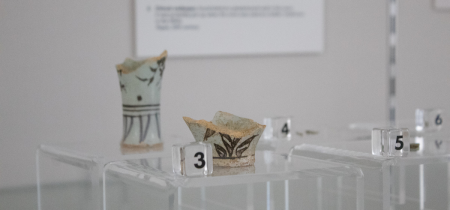Dissecting the dirt - 2024
Join our Dissecting the dirt advanced archaeology club for young people aged 16 - 25!
Gain valuable transferable skills including project management and leadership by planning and supporting our Young Archaeologists Club, then get in-depth archaeological training from our community archaeologist, Alexis. These full-day sessions are filled with exciting hands-on opportunities to gain valuable skills for the future!
You’ll start by helping with our Young Archaeologists’ Club and later in the term, you will plan and facilitate the upcoming sessions. In the afternoon you'll focus on gaining in-depth, practical archaeological training – the skills you’ll learn are useful in the field, but also in many different career paths. The sessions will be informative, interesting and will give you a chance to get creative!
Schedule:
20 January - stratigraphic analysis
What is stratigraphy and why is it important? Stratigraphy relates to how sites form. The recording processes involved in an excavation are subsequently utilised to analyse how sites developed and changed over time. This analysis forms the core of interpreting an archaeological excavation. Together we’ll explore stratigraphy and its importance in the archaeological process.
17 February - finds processing
How do you process an archaeological archive from an excavation? What are the protocols and techniques involved in preparing the archive? This session will look at how finds are washed, dried, marked and bagged and finally stored. Archives have to be produced in a systematic fashion so that records of excavations are catalogued correctly for both present and future analysis.
16 March - spot dating & phasing
How do we phase our matrices? Matrices form the backbone of an archaeological excavation and when combined with specialist analysis can be phased by period. This makes it possible to analyse how a site has changed over time, both in terms of use and development. In this session, we’ll cover an introduction to using specialist evidence to determine a site’s chronology.
27 April - desk-based assessments
Desk Based Assessments are generally prepared prior to an archaeological excavation. And are important pieces of research as historical maps are analysed alongside data from the Sites and Monuments Record. Together we’ll explore the importance of desk-based assessments and the crucial role they play in archaeology today.
Ticket options
Help support Fulham Palace
To support Fulham Palace Trust with a donation, please ensure the box is ticked. Should you wish not to donate, simply click on the green slider below.
Thank you for supporting Fulham Palace.
Join our Dissecting the dirt advanced archaeology club for young people aged 16 - 25!
Gain valuable transferable skills including project management and leadership by planning and supporting our Young Archaeologists Club, then get in-depth archaeological training from our community archaeologist, Alexis. These full-day sessions are filled with exciting hands-on opportunities to gain valuable skills for the future!
You’ll start by helping with our Young Archaeologists’ Club and later in the term, you will plan and facilitate the upcoming sessions. In the afternoon you'll focus on gaining in-depth, practical archaeological training – the skills you’ll learn are useful in the field, but also in many different career paths. The sessions will be informative, interesting and will give you a chance to get creative!
Schedule:
20 January - stratigraphic analysis
What is stratigraphy and why is it important? Stratigraphy relates to how sites form. The recording processes involved in an excavation are subsequently utilised to analyse how sites developed and changed over time. This analysis forms the core of interpreting an archaeological excavation. Together we’ll explore stratigraphy and its importance in the archaeological process.
17 February - finds processing
How do you process an archaeological archive from an excavation? What are the protocols and techniques involved in preparing the archive? This session will look at how finds are washed, dried, marked and bagged and finally stored. Archives have to be produced in a systematic fashion so that records of excavations are catalogued correctly for both present and future analysis.
16 March - spot dating & phasing
How do we phase our matrices? Matrices form the backbone of an archaeological excavation and when combined with specialist analysis can be phased by period. This makes it possible to analyse how a site has changed over time, both in terms of use and development. In this session, we’ll cover an introduction to using specialist evidence to determine a site’s chronology.
27 April - desk-based assessments
Desk Based Assessments are generally prepared prior to an archaeological excavation. And are important pieces of research as historical maps are analysed alongside data from the Sites and Monuments Record. Together we’ll explore the importance of desk-based assessments and the crucial role they play in archaeology today.




